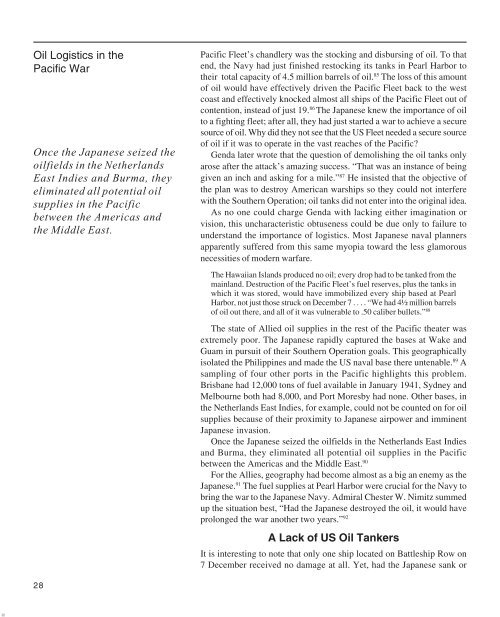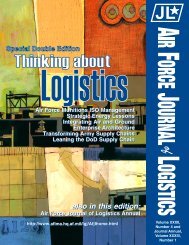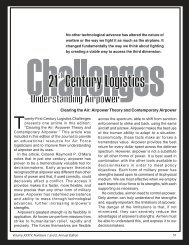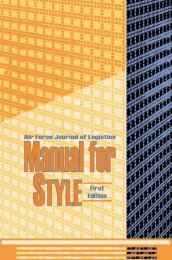Old Lessons, New Thoughts - AF Logistics Management Agency
Old Lessons, New Thoughts - AF Logistics Management Agency
Old Lessons, New Thoughts - AF Logistics Management Agency
Create successful ePaper yourself
Turn your PDF publications into a flip-book with our unique Google optimized e-Paper software.
Oil <strong>Logistics</strong> in the<br />
Pacific War<br />
Once the Japanese seized the<br />
oilfields in the Netherlands<br />
East Indies and Burma, they<br />
eliminated all potential oil<br />
supplies in the Pacific<br />
between the Americas and<br />
the Middle East.<br />
28<br />
Pacific Fleet’s chandlery was the stocking and disbursing of oil. To that<br />
end, the Navy had just finished restocking its tanks in Pearl Harbor to<br />
their total capacity of 4.5 million barrels of oil. 85 The loss of this amount<br />
of oil would have effectively driven the Pacific Fleet back to the west<br />
coast and effectively knocked almost all ships of the Pacific Fleet out of<br />
contention, instead of just 19. 86 The Japanese knew the importance of oil<br />
to a fighting fleet; after all, they had just started a war to achieve a secure<br />
source of oil. Why did they not see that the US Fleet needed a secure source<br />
of oil if it was to operate in the vast reaches of the Pacific?<br />
Genda later wrote that the question of demolishing the oil tanks only<br />
arose after the attack’s amazing success. “That was an instance of being<br />
given an inch and asking for a mile.” 87 He insisted that the objective of<br />
the plan was to destroy American warships so they could not interfere<br />
with the Southern Operation; oil tanks did not enter into the original idea.<br />
As no one could charge Genda with lacking either imagination or<br />
vision, this uncharacteristic obtuseness could be due only to failure to<br />
understand the importance of logistics. Most Japanese naval planners<br />
apparently suffered from this same myopia toward the less glamorous<br />
necessities of modern warfare.<br />
The Hawaiian Islands produced no oil; every drop had to be tanked from the<br />
mainland. Destruction of the Pacific Fleet’s fuel reserves, plus the tanks in<br />
which it was stored, would have immobilized every ship based at Pearl<br />
Harbor, not just those struck on December 7 . . . . “We had 4½ million barrels<br />
of oil out there, and all of it was vulnerable to .50 caliber bullets.” 88<br />
The state of Allied oil supplies in the rest of the Pacific theater was<br />
extremely poor. The Japanese rapidly captured the bases at Wake and<br />
Guam in pursuit of their Southern Operation goals. This geographically<br />
isolated the Philippines and made the US naval base there untenable. 89 A<br />
sampling of four other ports in the Pacific highlights this problem.<br />
Brisbane had 12,000 tons of fuel available in January 1941, Sydney and<br />
Melbourne both had 8,000, and Port Moresby had none. Other bases, in<br />
the Netherlands East Indies, for example, could not be counted on for oil<br />
supplies because of their proximity to Japanese airpower and imminent<br />
Japanese invasion.<br />
Once the Japanese seized the oilfields in the Netherlands East Indies<br />
and Burma, they eliminated all potential oil supplies in the Pacific<br />
between the Americas and the Middle East. 90<br />
For the Allies, geography had become almost as a big an enemy as the<br />
Japanese. 91 The fuel supplies at Pearl Harbor were crucial for the Navy to<br />
bring the war to the Japanese Navy. Admiral Chester W. Nimitz summed<br />
up the situation best, “Had the Japanese destroyed the oil, it would have<br />
prolonged the war another two years.” 92<br />
A Lack of US Oil Tankers<br />
It is interesting to note that only one ship located on Battleship Row on<br />
7 December received no damage at all. Yet, had the Japanese sank or





